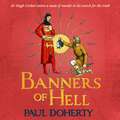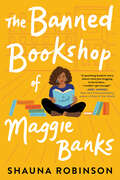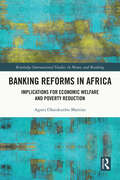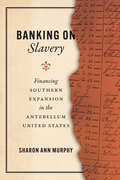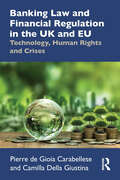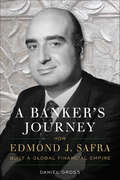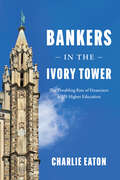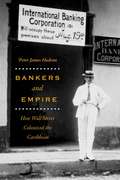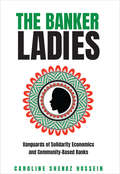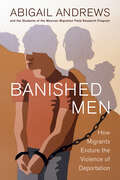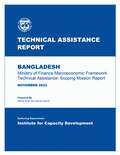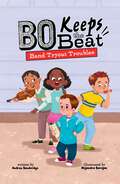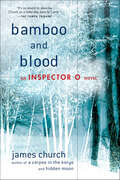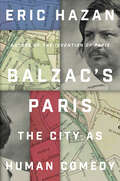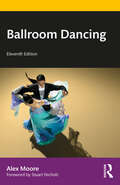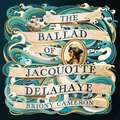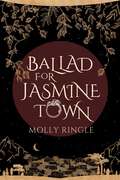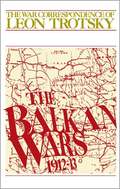- Table View
- List View
Banners of Hell: Hugh Corbett 24
by Paul DohertySummer 1312. The brutal murder of King Edward II's favourite, Peter Gaveston, unleashes a horde of demons . . .Sir Hugh Corbett, Keeper of the Secret Seal, hastens to the Dominican Priory at Blackfriars where Gaveston's corpse awaits burial. But, on arrival, Corbett discovers that a series of macabre murders has turned the priory into a mansion of death, and a killer is roaming free.Meanwhile, rumours spread that the pirate ships of the Black Banner Fleet are intent on entering the River Thames and, if the Sea Beggars succeed in their mission, they will weaken the king's power throughout the city. Once again, Corbett must employ his wit and ingenuity to navigate the dangerous and deadly challenges ahead and bring the culprits to justice before matters turn grave indeed.What readers say about Paul Doherty:'Paul Doherty's depictions of medieval England are truly outstanding''Another brilliant story in the excellent Hugh Corbett series by a superb historical author''Good plots, clever twists and mostly impossible to work out'
Banners of Hell: Hugh Corbett 24
by Paul DohertySummer 1312. The brutal murder of King Edward II's favourite, Peter Gaveston, unleashes a horde of demons . . .Sir Hugh Corbett, Keeper of the Secret Seal, hastens to the Dominican Priory at Blackfriars where Gaveston's corpse awaits burial. But, on arrival, Corbett discovers that a series of macabre murders has turned the priory into a mansion of death, and a killer is roaming free.Meanwhile, rumours spread that the pirate ships of the Black Banner Fleet are intent on entering the River Thames and, if the Sea Beggars succeed in their mission, they will weaken the king's power throughout the city. Once again, Corbett must employ his wit and ingenuity to navigate the dangerous and deadly challenges ahead and bring the culprits to justice before matters turn grave indeed.What readers say about Paul Doherty:'Paul Doherty's depictions of medieval England are truly outstanding''Another brilliant story in the excellent Hugh Corbett series by a superb historical author''Good plots, clever twists and mostly impossible to work out'
The Banned Bookshop of Maggie Banks: A Novel
by Shauna Robinson"A sparkling bookish story about rules just begging to be broken." — Abby Jimenez, New York Times bestselling author of Part of Your World and The Friend ZoneI, Maggie Banks, solemnly swear to uphold the rules of Cobblestone Books. If only, I, Maggie Banks, believed in following the rules.When Maggie Banks arrives in Bell River to run her best friend's struggling bookstore, she expects to sell bestsellers to her small-town clientele. But running a bookstore in a town with a famously bookish history isn't easy. Bell River's literary society insists on keeping the bookstore stuck in the past, and Maggie is banned from selling anything written this century. So, when a series of mishaps suddenly tip the bookstore toward ruin, Maggie will have to get creative to keep the shop afloat.And in Maggie's world, book rules are made to be broken.To help save the store, Maggie starts an underground book club, running a series of events celebrating the books readers actually love. But keeping the club quiet, selling forbidden books, and dodging the literary society is nearly impossible. Especially when Maggie unearths a town secret that could upend everything. Maggie will have to decide what's more important: the books that formed a small town's history, or the stories poised to change it all.
Banking Reforms in Africa: Implications for Economic Welfare and Poverty Reduction (Routledge International Studies in Money and Banking)
by Agnes Olatokunbo MartinsThis book comprehensively explores the intricate relationship between banking reforms, economic well-being, and poverty reduction across the African continent. Delving into the historical roots of banking reforms, it examines the resilience of banking sectors in key African countries like South Africa, Nigeria, Kenya, MENA, and beyond.The findings suggest that much attention should be paid to the design of banking systems and how banks are regulated. This focus on banks differs from many discussions on the topic, which tend to be more concerned with other policy areas such as economic policy, international trade policy, and aid. The book’s extensive and contemporary overview of banking reforms enables a comparative analysis of regulatory frameworks, supervision practices, and government interventions. It evaluates theoretical frameworks linking banking reforms to bank stability and resilience, drawing on financial intermediation, resource allocation, systemic risk, and financial development concepts. It empirically tests the causal relationships between the Basel II/III capital reforms, bank sector resilience, economic growth, and poverty reduction and identifies and analyses the channels and mechanisms through which banking reforms affect economic welfare and poverty reduction in Africa, such as credit availability, financial efficiency, financial innovation, and financial access.The book offers an insightful exploration into a brighter economic future on the African continent. The findings presented herein offer valuable insights for policymakers, researchers, and practitioners striving to enhance financial stability, foster economic growth, and alleviate poverty in Africa.
Banking on Slavery: Financing Southern Expansion in the Antebellum United States (American Beginnings, 1500-1900 Ser.)
by Sharon AnnA sobering excavation of how deeply nineteenth-century American banks were entwined with the institution of slavery. It’s now widely understood that the fullest expression of nineteenth-century American capitalism was found in the structures of chattel slavery. It’s also understood that almost every other institution and aspect of life then was at least entangled with—and often profited from—slavery’s perpetuation. Yet as Sharon Ann Murphy shows in her powerful and unprecedented book, the centrality of enslaved labor to banking in the antebellum United States is far greater than previously thought. Banking on Slavery sheds light on precisely how the financial relationships between banks and slaveholders worked across the nineteenth-century South. Murphy argues that the rapid spread of slavery in the South during the 1820s and ’30s depended significantly upon southern banks’ willingness to financialize enslaved lives, with the use of enslaved individuals as loan collateral proving central to these financial relationships. She makes clear how southern banks were ready—and, in some cases, even eager—to alter time-honored banking practices to meet the needs of slaveholders. In the end, many of these banks sacrificed themselves in their efforts to stabilize the slave economy. Murphy also details how banks and slaveholders transformed enslaved lives from physical bodies into abstract capital assets. Her book provides an essential examination of how our nation’s financial history is more intimately intertwined with the dehumanizing institution of slavery than scholars have previously thought.
Banking Law and Financial Regulation in the UK and EU: Technology, Human Rights and Crises
by Pierre de Gioia Carabellese Camilla Della GiustinaBanking Law and Financial Regulation in the UK and EU seeks to blend orthodox topics covered within the banking and financial law syllabus, such as sources of banking and financial law, financial markets, financial and banking institutions, financial transactions, and banking and financial insolvency, with a careful analysis of emerging issues and more contemporary topics.This advanced-level textbook offers a new format for the study of banking and financial law, placing it within the wider context of economic development. As such, two elements are integral to this new methodology: the rise of techno-banking and digitalisation of the financial sector, and Brexit. Departing from the approaches of more traditional textbooks in this area, the book also takes a comparative approach to UK and EU banking law, highlighting the legal consequences of the UK’s exit from the EU. Aspects of human rights are integrated throughout and current debates and developments around financial crises – the advancement of technological innovations in the banking sector and contemporary topics, such as health crises, energy, and ESG and the environment – is taken into account to provide the reader with the opportunity to develop their own autonomous and broader understanding of the various concepts.Banking Law and Financial Regulation in the UK and EU will be a valuable text for students taking advanced undergraduate and postgraduate-level courses in banking law and financial law, as well as practising lawyers, managers and accountants.
A Banker's Journey: How Edmond J. Safra Built a Global Financial Empire
by Daniel GrossWho was Edmond J. Safra? “The greatest banker of his generation,” in the estimation of a former World Bank President. The founder of four massive financial institutions on three continents, and a proud child of Beirut’s Jewish quarter. An innovative avatar of financial globalization, and a faithful heir to a tradition of old-world banking. The leading champion and protector of the Sephardic diaspora. In A Banker’s Journey, financial journalist and historian Daniel Gross, who, like Safra, traces his heritage to Aleppo, Syria, reconstructs the public life of an intensely private man. With exclusive access to Safra’s personal archives, Gross tracks the banker’s remarkable journey from Beirut to Milan, São Paulo, Geneva, and New York—to the pinnacle of global finance. Edmond Safra was fifteen in 1947, when his father sent him to establish a presence in Milan, Italy. Fluent in six languages, and with an eye for value, managing risk, and personal potential, Safra was in perpetual motion until his tragic death in 1999. The modern, global financial empire he built was based on timeless principles: a banker must protect his depositors and avoid excessive leverage and risk. In an age of busts and bailouts, Safra posted remarkable returns while rarely suffering a credit loss. From a young age, Safra assumed the mantle of leadership in the Syrian-Lebanese Jewish community, providing personal aid, supporting the communities that formed in exile, and championing Sephardic religious and educational efforts in Israel and around the world. Edmond J. Safra’s life of achievement in the twentieth century offers enduring lessons for those seeking to make their way in the twenty-first century. He inspired generations to make the world a better place.
Bankers in the Ivory Tower: The Troubling Rise of Financiers in US Higher Education
by Charlie EatonExposes the intimate relationship between big finance and higher education inequality in America. Elite colleges have long played a crucial role in maintaining social and class status in America while public universities have offered a major stepping-stone to new economic opportunities. However, as Charlie Eaton reveals in Bankers in the Ivory Tower, finance has played a central role in the widening inequality in recent decades, both in American higher education and in American society at large. With federal and state funding falling short, the US higher education system has become increasingly dependent on financial markets and the financiers that mediate them. Beginning in the 1980s, the government, colleges, students, and their families took on multiple new roles as financial investors, borrowers, and brokers. The turn to finance, however, has yielded wildly unequal results. At the top, ties to Wall Street help the most elite private schools achieve the greatest endowment growth through hedge fund investments and the support of wealthy donors. At the bottom, takeovers by private equity transform for-profit colleges into predatory organizations that leave disadvantaged students with massive loan debt and few educational benefits. And in the middle, public universities are squeezed between incentives to increase tuition and pressures to maintain access and affordability. Eaton chronicles these transformations, making clear for the first time just how tight the links are between powerful financiers and America’s unequal system of higher education.
Bankers and Empire: How Wall Street Colonized the Caribbean
by Peter James HudsonFrom the end of the nineteenth century until the onset of the Great Depression, Wall Street embarked on a stunning, unprecedented, and often bloody period of international expansion in the Caribbean. A host of financial entities sought to control banking, trade, and finance in the region. In the process, they not only trampled local sovereignty, grappled with domestic banking regulation, and backed US imperialism—but they also set the model for bad behavior by banks, visible still today. In Bankers and Empire, Peter James Hudson tells the provocative story of this period, taking a close look at both the institutions and individuals who defined this era of American capitalism in the West Indies. Whether in Wall Street minstrel shows or in dubious practices across the Caribbean, the behavior of the banks was deeply conditioned by bankers’ racial views and prejudices. Drawing deeply on a broad range of sources, Hudson reveals that the banks’ experimental practices and projects in the Caribbean often led to embarrassing failure, and, eventually, literal erasure from the archives.
The Banker Ladies: Vanguards of Solidarity Economics and Community-Based Banks
by Caroline Shenaz HosseinAll over the world, Black and racialized women engage in the solidarity economy through what is known as mutual aid financing. Formally referred to as rotating savings and credit associations (ROSCAs), these institutions are purposefully informal to support the women’s livelihoods and social needs, and they act to reject tiered forms of neo-liberal development. The Banker Ladies – a term coined by women in the Black diaspora – are individuals that voluntarily organize ROSCAs for self-sufficiency and are intentional in their politicized economic co-operation to counter business exclusion. Caroline Shenaz Hossein reveals how Black women redefine the banking co-operative sector to be inclusive of informal institutions that are democratic and focused on group consensus, and which build an activist form of economic co-operation that is intent on making social profitability the norm. The book examines the ways in which diasporic Black women, who organize mutual aid, receive little to no attention. Unapologetically biased towards a group of women who have been purposely sidelined and put down for what they do, The Banker Ladies highlights how, in order to educate oneself about their contributions to politics and economics, it is imperative to listen to the voices of hundreds of Black women in charge of financial services for their communities.
Banished Men: How Migrants Endure the Violence of Deportation
by Abigail Leslie AndrewsA free ebook version of this title is available through Luminos, University of California Press’s Open Access publishing program. Visit www.luminosoa.org to learn more. What becomes of men the U.S. locks up and kicks out? From 2009 to 2020, the U.S. deported more than five million people—over 90 percent of them men. In Banished Men, Abigail Andrews and her students tell 186 of their stories. How, they ask, does expulsion shape men's lives and sense of themselves? The book uncovers a harrowing carceral system that weaves together policing, prison, detention, removal, and border militarization to undermine migrants as men. Guards and gangs beat them down, till they feel like cockroaches, pigs, or dogs. Many lose ties with family. They do not go "home." Instead, they end up in limbo: stripped of their very humanity. Against the odds, they fight for new ways to belong. At once devastating and humane, Banished Men offers a clear-eyed critique of the violence of deportation.
Bangladesh: Technical Assistance Report-Ministry of Finance Macroeconomic Framework Technical Assistance: Scoping Mission Report
by International Monetary Fund. Institute for Capacity DevelopmentA report from the International Monetary Fund.
Band Tryout Troubles (Bo Keeps The Beat Ser.)
by Andrew Bambridge"Bo is starting a band! He is super excited and knows exactly what kind of band he wants. But when Bo invites his friends to audition, no one quite lives up to his high expectations. Bo has a choice to make—a band with friends who all have their own ideas, or a band with one member: himself! Will Bo compromise or go solo? Musician, educator, and actor Andrew Bambridge (Pixels) offers a charming chapter book series about a boy named Bo who, like Andrew, has achondroplasia and has always loved music."
Bamboo Kingdom #5: The Lightning Path (Bamboo Kingdom #5)
by Erin HunterExplore the secrets of the Bamboo Kingdom in the fifth installment of this thrilling new series from bestselling Warriors author Erin Hunter, perfect for fans of the Wings of Fire and Endling series.The three Dragon Speakers must face their own troubles before they can help the Bamboo Kingdom regain peace.After being forced out of Rain’s camp for a murder he did not commit, Ghost is still determined to prove his innocence. And though Rain isn’t convinced Ghost is guilty, she knows that if it wasn’t him, that means the killer is still at large—and still targeting her loved ones.As Ghost sets out to reunite both of his families, Leaf is nowhere to be found, and the monkeys are watching their every move. With only piecemeal guidance from a Great Dragon that’s been split in three, how can they hope to stop what Brawnshanks is planning?
Bamboo and Blood: An Inspector O Novel (The Inspector O Novels #3)
by James ChurchThe critically acclaimed A Corpse in the Koryo brought readers into the enigmatic workings of North Korean intelligence with the introduction of a new kind of detective---the mysterious Inspector O. In the follow-up, Hidden Moon, O threaded his way through the minefield of North Korean ministries into a larger conspiracy he was never supposed to touch.Now the inspector returns . . .In the winter of 1997, trying to stay alive during a famine that has devastated much of North Korea, Inspector O is ordered to play host to an Israeli agent who appears in Pyongyang. When the wife of a North Korean diplomat in Pakistan dies under suspicious circumstances, O is told to investigate, with a curious proviso: Don't look too closely at the details, and stay away from the question of missiles. O knows he can't avoid finding out what he is supposed to ignore on a trail that leads him from the dark, chilly rooms of Pyongyang to an abandoned secret facility deep in the countryside, guarded by a lonely general; and from the streets of New York to a bench beneath a horse chestnut tree on the shores of Lake Geneva, where the Inspector discovers he is up to his ears in missiles---and worse. Stalked by the past and wary of the future, O is convinced there is no one he can trust, and no one he can't suspect. Swiss intelligence wants him out of the country; someone else wants him dead.Once again, James Church's spare, lyrical prose guides readers through an unfamiliar landscape of whispered words and shadows, a world wrapped in a level of mystery and complexity that few outsiders have experienced. With Inspector O, noir has a new home in North Korea, and James Church holds the keys.
Balzac's Paris: The City as Human Comedy
by Eric HazanExploring Paris arm in arm with Balzac, nineteenth-century France&’s most famous novelist and observerIn Balzac&’s vast Human Comedy, a body of ninety-one completed novels and stories, he endeavoured to create a complete picture of contemporary French society and manners. Within this work is a loving ode to Paris and an incomparable introduction to the first capital of the modern world.To this ageless city he makes a declaration of love in an accumulation of finely observed detail – the cafés, landmarks, avenues, parks – and captures the populace in countless meticulously drawn portraits: its lawyers, grisettes, journalists, concierges, usurers, salesmen, speculators.Balzac gathered the elements of this Paris by sauntering through it. &‘To saunter is a science,&’ he writes, &‘it is the gastronomy of the eye. To take a walk is to vegetate; to saunter is to live.&’ Eric Hazan follows in Balzac&’s footsteps, criss-crossing the city in the novelist&’s outsize boots, running between printers, publishers, coffee merchants, mistresses and friends, stopping for a moment, struck by a detail that would be fixed in Balzac&’s photographic memory.More than a tour of the city, Balzac&’s Paris is an attempt to measure the soul of a city as recovered in its finest literature.
Ballroom Dancing
by Alex MooreNow in its eleventh edition, this classic and comprehensive handbook has been revised to bring it up to date with changes on the dance floor and in the rules of dance competitions.The Quickstep, Waltz, Foxtrot, and Tango are all illustrated and described in great detail, as well as the versions of most dances approved for championships. Diagrams demonstrate every step from both the Leader’s and Follower’s perspectives, and a collection of photographs new to this edition celebrate the diverse range of dancers involved with ballroom.This is the go-to book for dancers, competition judges, teachers, and anyone who needs to be at the forefront of today’s ballroom technique, from amateur practice to international championships.
Ballast Water Treatment and Exchange for Ships (Synthesis Lectures on Ocean Systems Engineering)
by Alexander Olsen Pamela Rossi CiampoliniThe inadvertent transfer of harmful aquatic organisms and pathogens in the ballast water of ships has been determined to have caused a significant adverse impact to many of the world's coastal regions. The international maritime community, under the auspices of the IMO has developed several documents, including the “International Conventions for the Control and Management of Ship's Ballast Water and Sediments, 2004”, (Ballast Water Management Convention), which are aimed at preventing the introduction of unwanted aquatic organisms and pathogens through the discharge of ballast water and sediments. The Ballast Water Management Convention applies to vessels registered in a country which is party to the Convention and to those vessels registered in other countries when operating in the waters of a country which is party to the Convention. As a means to prevent, minimize and ultimately eliminate the risk to the environment, human health, property and resources arising from the transferof harmful aquatic organisms and pathogens through the control and management of vessel's ballast water and sediment, as well as to avoid unwanted side-effects from that control, the Convention requires vessels to conduct a ballast water exchange or be fitted with an approved ballast water management system. It is noted that several studies have shown that the effectiveness of ballast water exchange varies and is dependent on the vessel type (design), exchange method (sequential, flow-through and dilution methods), ballasting system configuration, exchange location, weather conditions and vessel's trading pattern. For these reasons (and others), it has been determined that ballast water exchange does not provide adequate protective measures to prevent damage from organisms and pathogens carried in a vessel's ballast, even though exchange was considered to be acceptable as an interim solution.This book includes updates for the clarification of Survey requirements and adds the definition of biological commissioning, testing as well as requirements for Class approved Service Providers to conduct biological commissioning testing. Moreover, this book includes updates due to the adoption of the requirements from IACS UR M74, Rev. 2 and UR F45 and is applicable for existing ships, where an application for approval for the plans of BWMS is made on or after 1 July 2022; or for new ships contracted for construction on or after 1 July 2022.
The Ballad of Roy Benavidez: The Life and Times of America's Most Famous Hispanic War Hero
by William SturkeyThe dramatic life of Vietnam War hero Roy Benavidez, revealing how Hispanic Americans have long shaped US history, from "a major new voice [with] lyrical powers as a biographer&” (David W. Blight, Pulitzer Prize–winning author of Frederick Douglass) In May 1968, while serving in Vietnam, Master Sergeant Roy Benavidez led the rescue of a reconnaissance team surrounded by hundreds of enemy soldiers. He saved the lives of at least eight of his comrades that day in a remarkable act of valor that left him permanently disabled. Awarded the Medal of Honor after a yearslong campaign, Benavidez became a highly sought-after public speaker, a living symbol of military heroism, and one of the country&’s most prominent Latinos. Now, historian William Sturkey tells Benavidez&’s life story in full for the first time. Growing up in Jim Crow–era Texas, Benavidez was scorned as &“Mexican&” despite his family&’s deep roots in the state. He escaped poverty by enlisting in a desegregating military and was first deployed amid the global upheavals of the 1950s. Even after receiving the Medal of Honor, Benavidez was forced to fight for disability benefits amid Reagan-era cutbacks. An unwavering patriot alternately celebrated and snubbed by the country he loved, Benavidez embodied many of the contradictions inherent in twentieth-century Latino life. The Ballad of Roy Benavidez places that experience firmly at the heart of the American story.
The Ballad of Jacquotte Delahaye: A Novel
by Briony CameronThis epic, dazzling tale based on true events illuminates a woman of color&’s rise to power as one of the few purported female pirate captains to sail the Caribbean, and the forbidden love story that will shape the course of history.In the tumultuous town of Yáquimo, Santo Domingo, Jacquotte Delahaye is an unknown but up-and-coming shipwright. Her dreams are bold but her ambitions are bound by the confines of her life with her self-seeking French father. When her way of life and the delicate balance of power in the town are threatened, she is forced to flee her home and become a woman on the run along with a motley crew of refugees, including a mysterious young woman named Teresa. Jacquotte and her band become indentured servants to the infamous Blackhand, a ruthless pirate captain who rules his ship with an iron fist. As they struggle to survive his brutality, Jacquotte finds herself unable to resist Teresa despite their differences. When Blackhand hatches a dangerous scheme to steal a Portuguese shipment of jewels, Jacquotte must rely on her wits, resourcefulness, and friends to survive. But she discovers there is a grander, darker scheme of treachery at play, and she ultimately must decide what price she is willing to pay to secure a better future for them all. An unforgettable tale told in three parts, The Ballad of Jacquotte Delahaye is a thrilling, buccaneering escapade filled with siege and battle, and is also a tender exploration of friendship, love, and the search for freedom and home.
The Ballad of Jacquotte Delahaye: An epic historical novel of love, revenge and piracy on the high seas
by Briony Cameron'Packed full of action, excitement, peril and romance on the high seas, this is the sapphic pirate book of my dreams' SARAH UNDERWOOD, author of Lies We Sing to the Sea'Thrilling, heart-pounding adventure meets thoughtful feminist history . . . a rare and special tale' VAISHNAVI PATEL, author of Kaikeyi'I flew through the pages as if my ability to breath depended on it . . . This book has stolen my heart!' THE DEBUT DIGEST__________________________________________1656, Saint-Domingue. In the dark confines of a cell, a prisoner is waiting. Soon the hangman will call her name. Jacquotte Delahaye. A name which has struck fear into even the mightiest of empires. For Jacquotte is no ordinary prisoner: she is a pirate.Fierce. Legendary. Deadly.As the hangman prepares the noose, Jacquotte's story is told, charting her humble origins from the island of Hispaniola to the deck of a fearsome pirate ship. There, against all odds, she swiftly rises through the ranks, travelling across the Caribbean, facing duels across land and sea, and savouring tender moments stolen in the night.With the sun rising, can Jacquotte fight her way to freedom and find the woman she loves? Or will she die a legend?__________________________________________Following one of the first purported female pirates to sail the Caribbean in the seventeenth century, this is a sweeping tale of adventure and buccaneering - and the forbidden love story that will shape the course of history. The perfect read for fans of The Ghost Ship by Kate Mosse and The Confessions of Frannie Langton by Sara Collins. 'A high-stakes, gripping adventure full of heart-pounding duels and bonds that run deeper than blood . . .will stay with readers long after the final page' LILLIE LAINOFF, author of One for All 'Unforgettable female characters, breathless adventure and passion a-plenty' JULIE WALKER, author of Bonny & Read 'Empowering. Uplifting. Illuminating. A tour de force of storytelling!' MENNA VAN PRAAG, author of The Sisters Grimm 'Gritty, exciting, and tender' KATHERINE BEUTNER, author of Killingly
The Ballad of Jacquotte Delahaye: An epic historical novel of love, revenge and piracy on the high seas
by Briony Cameron'Packed full of action, excitement, peril and romance on the high seas, this is the sapphic pirate book of my dreams' SARAH UNDERWOOD, author of Lies We Sing to the Sea'Thrilling, heart-pounding adventure meets thoughtful feminist history . . . a rare and special tale' VAISHNAVI PATEL, author of Kaikeyi'I flew through the pages as if my ability to breath depended on it . . . This book has stolen my heart!' THE DEBUT DIGEST__________________________________________1656, Saint-Domingue. In the dark confines of a cell, a prisoner is waiting. Soon the hangman will call her name. Jacquotte Delahaye. A name which has struck fear into even the mightiest of empires. For Jacquotte is no ordinary prisoner: she is a pirate.Fierce. Legendary. Deadly.As the hangman prepares the noose, Jacquotte's story is told, charting her humble origins from the island of Hispaniola to the deck of a fearsome pirate ship. There, against all odds, she swiftly rises through the ranks, travelling across the Caribbean, facing duels across land and sea, and savouring tender moments stolen in the night.With the sun rising, can Jacquotte fight her way to freedom and find the woman she loves? Or will she die a legend?__________________________________________Following one of the first purported female pirates to sail the Caribbean in the seventeenth century, this is a sweeping tale of adventure and buccaneering - and the forbidden love story that will shape the course of history. The perfect read for fans of The Ghost Ship by Kate Mosse and The Confessions of Frannie Langton by Sara Collins. 'A high-stakes, gripping adventure full of heart-pounding duels and bonds that run deeper than blood . . .will stay with readers long after the final page' LILLIE LAINOFF, author of One for All'Unforgettable female characters, breathless adventure and passion a-plenty' JULIE WALKER, author of Bonny & Read 'Empowering. Uplifting. Illuminating. A tour de force of storytelling!' MENNA VAN PRAAG, author of The Sisters Grimm 'Gritty, exciting, and tender' KATHERINE BEUTNER, author of Killingly
Ballad for Jasmine Town (Eidolonia #2)
by Molly RingleA law-abiding metalworking witch and a form-shifting half-fae musician embark on a secret romance, but soon become caught in escalating tensions between fae and humans that threaten their hometown. The second story after the popular Lava Red Feather Blue comes alive in Ballad for Jasmine Town.The town of Miryoku has ocean views, fragrant jasmine vines, and a thriving arts scene, including a popular nineties cover band. It also sits on the verge, sharing a border with fae territory, a realm of both enchantments and dangers. Rafi has been unusual all his life: a human born to a fae mother, a mortal denizen of the fae realm, a form-shifter. He aches to join the human world, but prejudices and legal tangles stand in his way. After the death of his beloved human grandmother at the careless hands of fae, his only connection to humans is the cover band he plays with—until he meets Roxana. Roxana is a dutiful single parent and a metalworking witch specializing in healing charms. When she meets Rafi one summer night and repairs an instrument string for him, they strike up a friendship that soon kindles into love. But she&’s moving away from Miryoku at summer&’s end, and Rafi must stay, determined to stop the fae who keep hurting townsfolk. Together, Roxana and Rafi formulate an idea that might tame the most dangerous offenders—or might only accelerate the doom of their hometown.
The Ball: Discovering the Object of the Game
by John FoxAnthropologist John Fox sets off on a worldwide adventure to thefarthest reaches of the globe and the deepest recesses of our ancientpast to answer a question inspired by his sports-loving son: "Why do we play ball?"From Mexican jungles to the small-town gridirons of Ohio, frommedieval villages and royal courts to modern soccer pitches andbaseball parks, The Ball explores the little-known origins ofour favorite sports across the centuries, and traces how a simpleinvention like the ball has come to stake an unrivaled claim on ourpassions, our money, and our lives. Equal parts history and travelogue,The Ball removes us from the scandals and commercialism of today'ssports world to uncover the true reasons we play ball, helping us reclaimour universal connection to the games we love.
The Balkan Wars (1912-13): The War Correspondence Of Leon Trotsky
by Leon Trotsky George Lavan WeissmanOn-the-spot analysis of national and social conflicts in the Balkans, written 80 years ago, sheds light on the conflicts shaking these countries today. Photos, maps, chronology, glossary, index.

